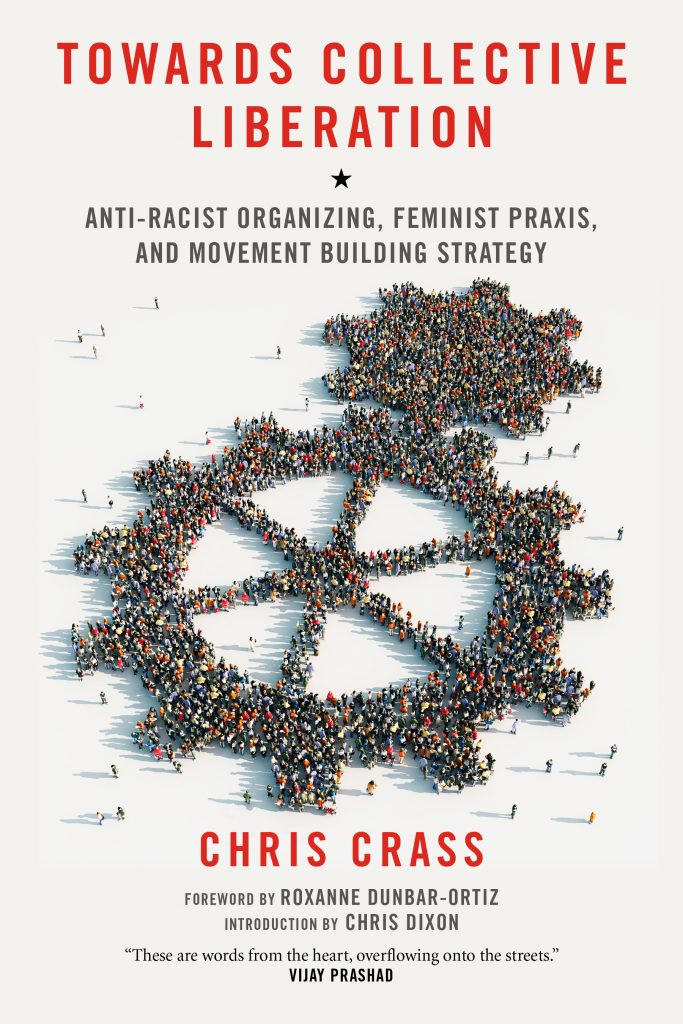
by Katy Otto
Sadie Magazine
June 28th, 2013
I first became acquainted with Chris Crass through a series of essays he wrote in various publications I read on the topic of confronting white privilege. I didn’t always know they were his pieces until I was finished reading them—they just spoke to some of the needs my burgeoning political development brought me, after introductions in college to a host of incredible women of color feminist thinkers and a desire to interrupt some very real race privilege and lack of consciousness in my own life.
Through more digging and discovery, I learned of Crass’s work with The Catalyst Project, and was able to go to one of his training sessions led in conjunction with many other organizers from that project at the National Conference on Organized Resistance, dubbed NCOR. When I learned last year that Crass was in the process of compiling a book, I was eager to read it—and happier still when Sadie suggested the review.
Towards Collective Liberation: Anti-Racist Organizing, Feminist Praxis, and Movement Building Strategy has a cover that would place it squarely on infoshop shelves throughout the country—two interlocking gears comprised of people working in tandem. However, there is much in this book that struck me as completely different from any activist tome I’d ever read. One thing Crass does that I’ve never seen before is credit other thinkers and activists throughout the book—including key people who helped him to develop analysis he cites throughout the pages. This honoring of the work of others, particularly women, queer people, and people of color, is really refreshing in a world where so many radical and anarchist texts that make it to a high number of readers are penned by white, heterosexual, cisgendered men. I appreciated Crass’s consistent sharing of credit in this unique way, and I would encourage this practice among other writers.
The book begins with a forward by Roxanne Dunbar-Ortiz, longtime mentor of Crass and workers’ rights visionary and organizer, and is divided into sections—Building the Anarchist Left; Developing Anti-Racist Feminist Practice; Lessons for Vision-Based, Strategic, Liberation Organizing Praxis; Lessons from Anti-Racist Organizing for Collective Liberation; and a conclusion, pulling together some ideas for an effective path forward. Crass’s knowledge of anarchist history and leftist organizing is vast, and he weaves it into a story of his own political and personal development. While some of the historical information on movements is dense, his passion for history is clear and helps encourage the reader along.
I was most moved by the personal descriptions and history of his involvement in San Francisco’s Food Not Bombs organization. The trials the organizers faced in doing their work to raise awareness of economic injustice, meet needs of the homeless and hungry, and build both a strong movement and a community with shared values and practices in pursuit of a better world. I could relate to the stories about conflicts within the group and the stress of trying to deal with sexual harassment within radical communities while simultaneously facing great state and police repression.
Most of all, one idea that Crass talks about throughout the book stuck with me—the ongoing desire to build the new world you want to inhabit within the shell of the old, knowing that this is a necessary step if you hope for the collective liberation you’ve worked for to survive. He underscores this by talking about overcoming crisis organizing—that is, always operating under duress, never being able to take the time as a movement, organization, or group to dream about what it is we want to build and create in addition to those things we know we want to end and tear down.
This is what makes Crass’s book such a vital read. It provides a balanced look at the value of historical understanding, ongoing analysis, imagination, self-inquiry, critique, sustainability practices, communication and messaging, and loving interrogation of ourselves as equally urgent components to building a groundswell social change movement. Crass is honest about his own mistakes and shortcomings, and humble in his assertion that we must be able to, not only face these head-on as organizers, but also to recognize that addressing ingrained systems of oppression within our own thinking is absolutely necessary to doing this work authentically.
I’d be
curious to see the kinds of reading groups and discussions this book
would engender, and I highly encourage activists, students, thinkers,
and organizers who work on social change efforts together to read it as a
group. In his book, Crass has given our movement(s) a great gift, and I
hope we take advantage of it as a jumping off point for our own
imaginations. Use this as fuel. I sure plan to.






